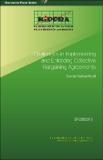| dc.date.accessioned | 2020-11-24T09:30:35Z | |
| dc.date.available | 2020-11-24T09:30:35Z | |
| dc.date.issued | 2018 | |
| dc.identifier.uri | http://repository.kippra.or.ke/handle/123456789/2190 | |
| dc.description.abstract | Collective bargaining and collective bargaining agreements (CBAs) have featured prominently in the last few years in Kenya, largely due to their perceived failure in averting industrial strikes. Collective bargaining in Kenya is primarily a legal process emanating at the first instance from the Constitution of Kenya and thereafter from Statutes. Collective bargaining is considered in the realm of employment and labour law and it is significant in relation to workers’ fundamental rights. However, as this study will reveal, there are several factors which, if considered in totality, significantly affect collective bargaining and collective bargaining agreements. This study serves as a guide in informing the general public on the nature, function and theoretical framework governing collective bargaining agreement. It provides policy recommendations as to how to reconcile the challenges faced and the factors undermining the collective bargaining process and resultant collective bargaining agreement for improved collective bargaining negotiations and improved enforceability of collective bargaining agreements. | en |
| dc.language.iso | en | en |
| dc.publisher | The Kenya Institute for Public Policy Research and Analysis (KIPPRA) | en |
| dc.relation.ispartofseries | DP/208/2018; | |
| dc.subject | Labor Laws | en |
| dc.subject | Employee Relations | en |
| dc.subject | Collective Bargaining Agreements | en |
| dc.subject | Kenya | en |
| dc.title | Discussion Paper No. 208 of 2018 on Challenges in Implementing and Enforcing Collective Bargaining Agreements | en |
| dc.type | KIPPRA Publications | en |
| ppr.contributor.author | Musili, Beverly Muthoki | |

